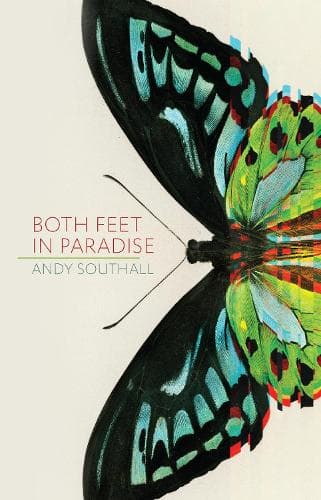Review: Both Feet in Paradise
Reviewed by David Hill
One of my tedious mantras is that there are a finite number of ways you can live as an author in New Zealand. You can have a second job or a university position. You can have a mega-hit, a la Eleanor Catton. You can have a financially supportive partner. Or you can be very versatile, moving among different forms and genres.
UK-born, Wellington-based Andy Southall shows every sign of being adept at the last option. He's already published well-received narratives of his times in Samoa and Sri Lanka. Now comes his second novel, with Samoa again providing the setting, though in a very different mood.
Our protagonists are Adam and Eve: an irresistible choice for a Pacific Eden, especially one where a character is reduced to his elemental self. Adam and his entomological field notes are about to fly out from Samoa to home and family in New Zealand. But with unsettling speed, his itinerary starts to unravel. Documents disappear; bookings never existed; computers fail; people and transport become evasive or obstructive. Even the landscape turns shifty: an international airport becomes an empty field at the end of a rutted track. Paradise warps into a prison and there's no way out.
The accelerating erosion of reality, the way quotidian events turn malevolent and one previously anonymous person after another seems “as if he knew more than he should,” is a real accomplishment on Southall's part.
Neither Adam nor Eve (if that's her name) when he meets her in a typically ambiguous scene, seems able to keep a grip on the increasingly slippery world. “Real” events are spliced in cleverly and even more disturbingly. Remember that business a few years back when a Whangārei digger driver ruptured a fuel supply line, grounding flights for some days? That features here as well but it instantly shape-shifts into yet another elusive event.
Plot and people are packed with ambivalence and metaphor. With Eve's help, Adam seems to be coping in the creepily rearranged environment. He still manages to enjoy a beer and an expensive steak, even if his credit card is inexplicably invalid, and the tablecloth somehow spattered. But at other moments, he's weirdly catatonic or missing. There's a centipede bite. A visit to Robert Louis Stevenson's grave slips into a vision of a hill climb near Paris. His daughter Naomi seems to have lurched forward in age.
There's a reason for it all, which even this précis may point to. How much of Adam's dilemma is “a memory of himself, the last fragment of a broken mind?” You have to be ready to make your own shifts, to accept a swelling comprehension that the true nature of events may be less tangible, more tragically trite than it first seems. Does the eventual, adroitly-managed realisation bear the weight of foregoing mysteries? I reckon so.
One mark of a mature writer is knowing what to leave out. The scenes and sentences here teem with detail and imagery: “the yellow trumpet of her beer.... a fiery smile.... she jumped to conclusions very quickly, faster than water tumbled from precipices.” They're inventive, dramatic, sometimes distracting. It's a novel where less could have brought more, both in terms of events and style.
Southall's reach may occasionally exceed his grasp but the guy knows how to evoke a mood and build a mystery. He moves his large cast of characters along and around very competently. The initial setup is compellingly ambivalent, even if later scenes languish occasionally. His next efforts will definitely be worth looking out for, especially if they come in The Cuba Press's elegantly designed (several ticks for Sarah Bolland) format.
Reviewed by David Hill
